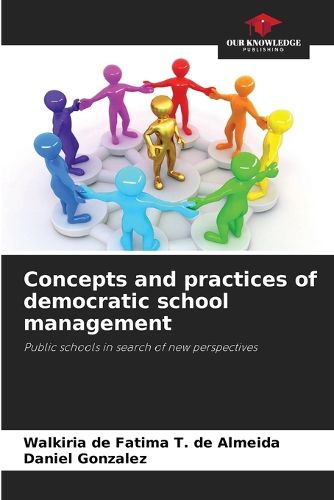Readings Newsletter
Become a Readings Member to make your shopping experience even easier.
Sign in or sign up for free!
You’re not far away from qualifying for FREE standard shipping within Australia
You’ve qualified for FREE standard shipping within Australia
The cart is loading…






This title is printed to order. This book may have been self-published. If so, we cannot guarantee the quality of the content. In the main most books will have gone through the editing process however some may not. We therefore suggest that you be aware of this before ordering this book. If in doubt check either the author or publisher’s details as we are unable to accept any returns unless they are faulty. Please contact us if you have any questions.
This work seeks to understand the conceptions and practices of democratic school management in a municipal school, based on the assumption that we live in a society with democratic principles, and that the school is the place to develop democratic practices. The general objective was to analyse the school's conceptions and practices of democratic school management. The relevance of this study is that a school that claims to be democratic allows all its agents to participate in decision-making. A qualitative approach was chosen because, according to Sampieri (2010), it seeks to understand the phenomena and interpret the data with greater breadth and clarity. The methodology was divided into four stages: the first focused on a critical-reflective reading of theorists on the categories discussed, such as Paro (1996, 2005, 2007, 2016); Lueck (2001, 2006) and Veiga (1997, 1998, 2001), among others. Next came the empirical part of the research, with a critical reading of the Pedagogical Political Project. school management has not yet allowed for greater participation in decision-making in school practices.
$9.00 standard shipping within Australia
FREE standard shipping within Australia for orders over $100.00
Express & International shipping calculated at checkout
This title is printed to order. This book may have been self-published. If so, we cannot guarantee the quality of the content. In the main most books will have gone through the editing process however some may not. We therefore suggest that you be aware of this before ordering this book. If in doubt check either the author or publisher’s details as we are unable to accept any returns unless they are faulty. Please contact us if you have any questions.
This work seeks to understand the conceptions and practices of democratic school management in a municipal school, based on the assumption that we live in a society with democratic principles, and that the school is the place to develop democratic practices. The general objective was to analyse the school's conceptions and practices of democratic school management. The relevance of this study is that a school that claims to be democratic allows all its agents to participate in decision-making. A qualitative approach was chosen because, according to Sampieri (2010), it seeks to understand the phenomena and interpret the data with greater breadth and clarity. The methodology was divided into four stages: the first focused on a critical-reflective reading of theorists on the categories discussed, such as Paro (1996, 2005, 2007, 2016); Lueck (2001, 2006) and Veiga (1997, 1998, 2001), among others. Next came the empirical part of the research, with a critical reading of the Pedagogical Political Project. school management has not yet allowed for greater participation in decision-making in school practices.